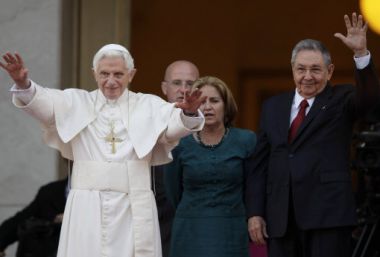Cuba to build its first Catholic church in over 50 years

A team of Cuban workers are only one permit away from beginning construction on the communist country's first Catholic church since 1959.
The engineers plan to use scrap metal from a stage built for Pope Emeritus Benedict XVI's 2012 visit in the church's construction.
The head engineer, Fausto Veloz, described the magnitude of using pieces of the historical stage.
"Reusing the metal means keeping alive the memory of something good for us Catholics," he told BBC News. "It gives it new life, so it can serve future generations."
Cuba is officially a secular state—they removed their atheist classification in 1992—although an estimated 60 per cent of their population is Catholic. No new churches have been sanctioned by the government, and church leaders were only allowed to renovate existing buildings. Other buildings received no renovations, and the country is dotted with former sanctuaries that are now mostly wreckage. Theft from churches is reportedly common.
"We really need our church back," Maria Perez told BBC. Her former church, San Predito, was looted and destroyed. Perez said that former congregants gather in the streets for mass whenever a travelling priest visits.
Cuban Christians without a church home also gather in each other's homes for service, but they look forward to the day they can worship inside a sanctuary.
"The Catholic community is big here but they've never had a church," Veloz said.
"I don't know how long it will take to complete but I'm sure we'll do it."
The task is arduous, however. Veloz said that $250,000 will be needed to complete the project – expected to come from international parishes.
Sketches of the proposed church building show an ornate cathedral, designed to accommodate over 600 parishioners.
The Archbishop of Santiago, Dionisio Garcia, expressed optimism regarding the ambitious and historic project.
"I think this doesn't only show improving attitudes in Cuba to the Catholic Church, but to churches in general," he said. "I think there's a better understanding of religious affairs."
Archbishop Garcia said that the country's improved relations with predominantly Christian countries such as Venezuela are a possible explanation for the change.
"That's why we hope it won't only be this church that we build," he stated. "We hope there'll be more."











